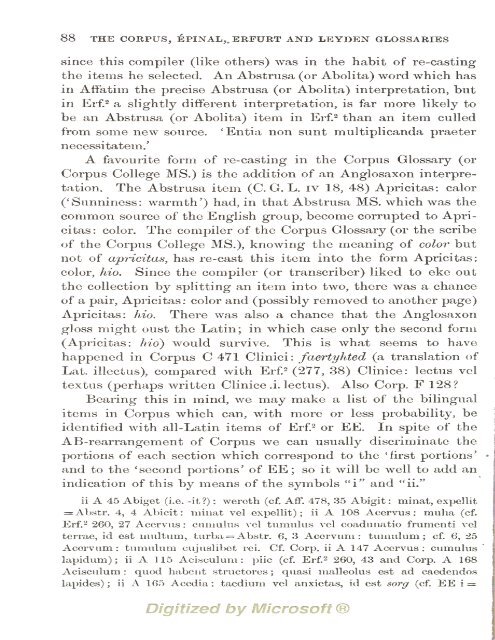the corpus, épinal, erfurt and leyden glossaries, viii - World eBook ...
the corpus, épinal, erfurt and leyden glossaries, viii - World eBook ...
the corpus, épinal, erfurt and leyden glossaries, viii - World eBook ...
Create successful ePaper yourself
Turn your PDF publications into a flip-book with our unique Google optimized e-Paper software.
88 THE CORPUS, EPINAL,, ERFURT AND LEYDEN GLOSSARIES<br />
since this compiler (like o<strong>the</strong>rs) was in <strong>the</strong> habit of re-casting<br />
<strong>the</strong> items he selected. An Abstrusa (or Abolita) word which has<br />
in Affatim <strong>the</strong> precise Abstrusa (or Abolita) interpretation, but<br />
in Erf.^ a slightly different interpretation, is far more likely to<br />
be an Abstrusa (or Abolita) item in Erf.^ than an item culled<br />
from some new source.<br />
necessitatem.'<br />
'Entia non sunt multiplic<strong>and</strong>a praeter<br />
A favourite form of re-casting in <strong>the</strong> Corpus Glossary (or<br />
Corpus College MS.) is <strong>the</strong> addition of an Anglosaxon interpretation.<br />
The Abstrusa item (C. G. L. iv 18, 48) Apricitas: calor<br />
('Sunniness: warmth') had, in that Abstrusa MS. which was <strong>the</strong><br />
common source of <strong>the</strong> English group, become corrupted to Apricitas<br />
: color. The compiler of <strong>the</strong> Corpus Glossary (or <strong>the</strong> scribe<br />
of <strong>the</strong> Corpus College MS.), knowing <strong>the</strong> meaning of color but<br />
not of apricitas, has re-cast this item into <strong>the</strong> form Apricitas:<br />
color, hio. Since <strong>the</strong> compiler (or transcriber) liked to eke out<br />
<strong>the</strong> collection by splitting an item into two, <strong>the</strong>re was a chance ;<br />
of a pair, Apricitas :<br />
color <strong>and</strong> (possibly removed to ano<strong>the</strong>r page)<br />
Apricitas: hio. There was also a chance that <strong>the</strong> Anglosaxon;<br />
gloss might oust <strong>the</strong> Latin; in which case only <strong>the</strong> second form ;<br />
(Apricitas: hio)<br />
would survive. This is what seems to have<br />
happened in Corpus C 471 Clinici: faertyhted (a translation of<br />
Lat. illectus), compared with Erf ^<br />
(277, 38)<br />
Clinice: lectus vol<br />
textus (perhaps written Clinice .i. lectus). Also Corp. F 128?<br />
Bearing this in mind, we may make a list of <strong>the</strong> bilingual<br />
items in Corpus which can, with more or less probability, be<br />
identified with all-Latin items of Erf^ or EE. In spite of <strong>the</strong><br />
AB-rearrangement of Corpus we can usually<br />
discriminate <strong>the</strong><br />
portions of each section which correspond to <strong>the</strong> 'first portions'<br />
so it will be well to add an<br />
<strong>and</strong> to <strong>the</strong> 'second portions' of EE ;<br />
indication of this by means of <strong>the</strong> symbols "i" <strong>and</strong> "ii."<br />
ii A 45 Abiget (i.e. -it?) : wereth (cf. Aff. 478, 35 Abigit : minat, expellit<br />
= Abstr. 4, 4 Abicit: rainat vel expellit); ii A 108 Acervus: muha (cf.<br />
Erf.2 260, 27 Acervus : cumulus<br />
vel tumulus vel coadunatio frumenti vel<br />
terrae, id est multum, turba = Abstr. 6, 3 Acervum : tumulum; cf. 6, 25<br />
Acervum : tumulum cujuslibet rei. Cf. ii Corp. A 147 Acervus ; cumulus<br />
: lapidum);<br />
Acisculum : quod<br />
lapides) ;<br />
ii A 115 Acisculum<br />
habent structores ; quasi<br />
piic (cf. Erf^ 260, 43 <strong>and</strong> Corp. A 168<br />
malleolus est ad caedendos<br />
ii A 165 Acedia: taedium vel anxietas, id est sorg (cf. EE i =

















